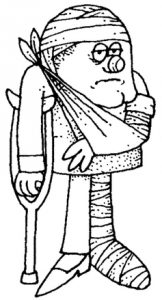A key objective of every civil law defense attorney is to limit the amount of money his or her client, the defendant, must pay to the suing party, the plaintiff. In Florida cases involving personal injuries, the damages for which the defendant may be held responsible for compensating the plaintiff fall into two categories, economic (e.g., lost wages and medical expenses) and non-economic (e.g., pain and suffering; mental anguish). (Non-economic damages are not recoverable in Florida workers’ compensation cases, where the law limits injured workers to compensation for medical and indemnity benefits only.)
Plaintiffs and defendants are in a never ending battle over the fairest and most accurate ways to demonstrate the plaintiffs’ damages past and future to juries. As it pertains to future medical expenses and past and future non-economic damages, a common area of dispute concerns what the jury is allowed to know in terms of past medical expenses. Plaintiffs argue that jurors should have the benefit of knowing the full amount of past medical charges regardless of how much was paid after reductions were made, for example, by Medicare, health insurance, settlement with another parry, and private negotiations. Defendants argue that the only relevant number is what has actually been paid or is owed, not what was billed.
In Durse v. Henn, 68 So. 2d 271 (Fla. 4th DCA 2011), the defendant in an automobile negligence action, Henn, filed a motion in limine to preclude the plaintiff, Durse, from presenting the full amount of his medical bills because his medical provider had accepted a lower amount as final satisfaction of all outstanding medical bills. Id. at 275. The trial court granted Henn’s motion. On appeal, Durse argued that the trial court’s ruling prejudiced “his ability to establish the value of future medical expenses and non-economic damages and contend[ed] that this [was] an issue that should be resolved post-verdict.” Id. Henn argued that the trial court must limit introduction of the amount of medical bills to the amount actually paid by Durse, rather than the original face value of the medical bills. Id.
 Florida Injury Attorney Blawg
Florida Injury Attorney Blawg









